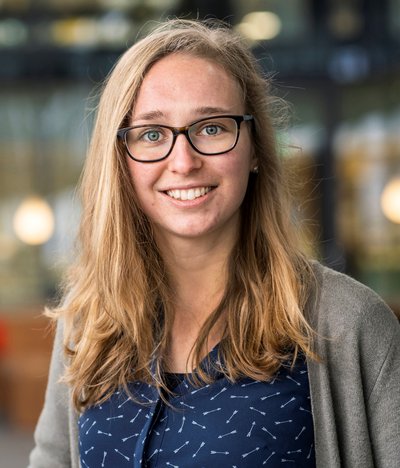Laura van Hazendonk
Department / Institute
Group

RESEARCH PROFILE
Printing processes may make the electronics industry more sustainable and flexible by avoiding wasteful processes like chemical etching and enabling efficient roll-to-roll manufacturing. Traditionally, printed conductors are composed of metals. However, metals are sensitive to electromigration, and while copper is toxic and erosion-sensitive, gold and silver are expensive. Graphene, a carbon allotrope, is also conductive, and proposes an abundant, nontoxic, and affordable alternative to metals in functional inks for printed conductors. To enable the commercialization of printed graphene conductors, sustainable and nontoxic graphene-based ink formulations with high printability and scalable production potential are desired. In our work, we develop graphene dispersions for printed conductors and aim to understand and control their colloidal properties.
ACADEMIC BACKGROUND
Laura van Hazendonk received a Double BSc Degree (cum laude) in Liberal Arts and Sciences from Maastricht University (the Netherlands) and the Albert-Ludwigs-University Freiburg (Germany), where she enjoyed a broad curriculum with a focus on Biochemistry and Bioinformatics. During her bachelors, she got the opportunity to study at the University of California, Los Angeles for an exchange quartile. After her bachelors, she transfered to Eindhoven University of Technology for a MSc in Materials Chemistry, where she graduated cum laude in 2020. During her masters, she worked as a research assistant in image analysis with Dr. Heiner Friedrich in the Laboratory of Materials and Interface Chemistry. She also joined the iGEM Eindhoven 2018 student team. With this team, she designed a living biomaterial for wound healing applications, which was rewarded with a gold medal in the international Genetically Engineered Machine competition. For her graduation research, Laura developed a systems approach for the study of collagen type I self-assembly under the supervision of Dr. Heiner Friedrich and Prof. dr. Remco Tuinier in the Laboratory of Physical Chemistry. Her thesis Engineering multiscale collagen scaffolds was awarded the AkzoNobel Graduation Award for Chemistry and Process Technology. After an internship at Corbion, she started as a PhD candidate in June 2020 in the Laboratory of Physical Chemistry, where she is continuing the collaboration with Dr. Heiner Friedrich and Prof. dr. Remco Tuinier.
Recent Publications
-
Laura S. van Hazendonk,Niels H. Vonk,Heiner Friedrich
Towards a predictive understanding of direct ink writing of graphene-based inks
Applied Materials Today (2024) -
Emma C. Giakoumatos,Berta Gumí Audenis,Álvaro González García,Laura S. van Hazendonk,Heiner Friedrich,Remco Tuinier,Ilja K. Voets
Quantifying the tuneable interactions between colloid supported lipid bilayers
Frontiers in Soft Matter (2023) -
Laura S. van Hazendonk,Artur M. Pinto,Kirill Arapov,Nikhil Pillai,Jean Pierre Teunissen,Asko Sneck,Maria Smolander,Corne H.A. Rentrop,Piet C.P. Bouten,Heiner Friedrich
Printed Stretchable Graphene Conductors for Wearable Technology
Chemistry of Materials (2022) -
Mohammad Soleimani,Sten J.J. van den Broek,Rick R.M. Joosten,Laura S. van Hazendonk,Sai P. Maddala,Lambert C.A. van Breemen,Rolf A.T.M. van Benthem,Heiner Friedrich
Investigating the Morphology and Mechanics of Biogenic Hierarchical Materials at and below Micrometer Scale
Nanomaterials (2022) -
Hanglong Wu,Hao Su,Rick R.M. Joosten,Laura S. van Hazendonk,Maarten J.M. Wirix,Joseph P. Patterson,Jozua Laven,Gijsbertus de With,Heiner Friedrich
Mapping and Controlling Liquid Layer Thickness in Liquid-Phase (Scanning) Transmission Electron Microscopy
Small Methods (2021)
Ancillary Activities
- Statenlid, Provinciale Staten van Noord-Brabant